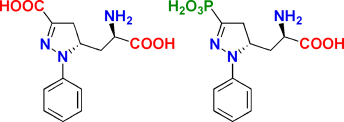As the most abundant neurotransmitter in the human central nervous system, L-glutamate plays a central role in a wide range of neurological processes. The N-methyl-D-aspartic acid (NMDA) receptor is one of several glutamate-activated receptors; over-activation of this receptor leads to an unchecked influx of Ca2+ which has been associated with brain and spinal cord injuries, epilepsy, and Alzheimer’s disease, among others. Therefore, specific NMDA receptor antagonists have the potential to treat a significant number of neurological disorders.
Paula Conti and colleagues at the University of Milan, Italy, along with collaborators from the Universities of Copenhagen, Florence, and Catanzaro, describe the design and synthesis of new antagonists that target NMDA receptor at the glutamate binding site. The authors performed pharmacological characterizations with various types and subtypes of glutamate receptors, and among the derivatives tested, two compounds stood out for their promising activity as neuroprotective and anticonvulsant agents.

- Novel 3-Carboxy- and 3-Phosphonopyrazoline Amino Acids as Potent and Selective NMDA Receptor Antagonists: Design, Synthesis, and Pharmacological Characterization
P. Conti, A. Pinto, L. Tamborini, U. Madsen, B. Nielsen, et al.
ChemMedChem 2010, 5(9).
DOI: 10.1002/cmdc.201000184



